|
ORIGINAL: Botvinnik - Smyslov World Championship Match (1954) ##########################
Smyslov events up to 16 March 1954 -<Moskvoretsky House of Pioneers Championship 1935> (Fall) 1st, with +11 -0 =0. Smyslov was later awarded the 1st category rank in the fall of 1936. Romanovsky, p.xi. In Vasily Smyslov, "My Best Games of Chess (1935-1957)" P.H. Clarke ed., transl. Routledge and Kegan Paul, 1958 ; Genna Sosonko, "The World Champions I Knew" (New in Chess 2013), pp.126-27 ==================
-<18th Moscow Championship 1938> (October) Shared 1st with Belevenets, with +10 -2 =5. Awarded the Soviet master title. Smyslov, "125 Games," p.9; [rusbase-1] Winter, p.149; Di Felice, "Chess Results, 1936-1940," p.191 ===
USSR Championship (1940) <12th USSR Championship> In Moscow (5 Sept - 3 Oct) 3d behind Lilienthal and Bondarevsky, ahead of Keres, Boleslavsky and Botvinnik, with +8 -1 =10. Bernard Cafferty and Mark Taimanov, "The Soviet Championships" (Cadogen 1998), p.48; [rusbase-2] Winter, pp.149 ===
USSR Absolute Championship (1941) In Leningrad and Moscow (23 March - 29 April). 3d behind Botvinnik and Keres, ahead of Boleslavsky, Lilienthal, and Bondarevsky, with +4 -4 =12. Awarded the Soviet grandmaster title based on 3d place finishes in both the <12th USSR Championship> and the <USSR Absolute Championship>. Smyslov, "125 Games" pp.9-10; [rusbase-3] Winter, p.149 ===
-<23d Moscow Championship 1943-1944?> (5 Dec 1943 - 12 Jan 1944?) Botvinnik dates this event as occurring only in Dec 1943.
Smyslov 2d behind Botvinnik, ahead of Alatortsev, Lisitsin, Yudovich, and Averbakh, with +7 -0 =9 (1 win was a default). Because Botvinnik was from Leningrad, Smyslov was actually declared Moscow champion. Winter, p.149; [rusbase-4], Di Felice, "Chess Results 1941-1946," p.131; Andrew Soltis, "Soviet Chess 1917-1991" (McFarland 1997), p.148; Botwinnik, "Schach in Russland 1941-45 mit sämtlichen Partien Swerdlowsk 1943," p.20 Smyslov vs Botvinnik, 1943 (1-0) This was Smyslov's first career victory over Botvinnik, and Botvinnik's only loss in the tournament. ==================
Groningen (1946) (13 Aug - 7 Sept) 3d, behind Botvinnik and Euwe, ahead of Najdorf, Szabó, Boleslavsky and Flohr, with +7 -1 =11. http://thechesslibrary.com/files/19... Winter, p.149 ===
FIDE World Championship Tournament (1948) In the Hague and Moscow (2 March - 17 May) 2d behind Botvinnik, ahead of Reshevsky, Keres and Euwe. http://thechesslibrary.com/files/19... Winter, p.149; Harry Golombek, "The World Chess Championship 1948" (Hardinge Simpole 1949), pp. 39-219 ===================
Budapest Candidates (1950) (9 April - 16 May) 3d behind Bronstein and Boleslavsky, ahead of Keres, Najdorf, Kotov, and Stahlberg, with +5 -3 =10. http://thechesslibrary.com/files/19... Winter, p.149 Smyslov:
<"3d place in the <<<Budapest Candidates 1950>>> gave me the automatic right to a place in the next Candidates Tournament."> Vasily Smyslov, "Smyslov's 125 Selected Games" Ken Neat transl. (Cadogen 1983), p.125 ===
Zuerich Candidates (1953) In Neuhausen am Rhein and Zürich (28 Aug - 24 Oct) 1st over Bronstein, Reshevsky, Keres, Petrosian, Najdorf, Geller and Kotov, with +9 -1 =18.
Winter, p.150; Di Felice "Chess Results 1951-1955," p.268; Miguel Najdorf, "Zürich 1953" Taylor Kingsford transl. (Russell Enterprises 2012), p.42 ###########################
Draft EDIT
Vasily Smyslov was born in Moscow in 1921. ############################
Match preparation -<Botvinnik>
Training games with Smyslov, before Botvinnik knew he would be facing Smyslov in a championship match: Smyslov-Botvinnik, October 25, 1951 Smyslov vs Botvinnik, 1951 Botvinnik-Smyslov, October 31, 1951 Botvinnik vs Smyslov, 1951 Botvinnik-Smyslov, February 13, 1952 Botvinnik vs Smyslov, 1952 Smyslov-Botvinnik, February 14, 1952 Smyslov vs Botvinnik, 1952 -Jan Timman, "Secret Matches: The Unknown Training Games of Mikhail Botvinnik" (Russell Enterprises Inc. 2000), pp.58-59 ===
At his dacha in <Nikolina gora> from 17 Oct. 1952 up until 13 Feb. 1954, on the eve of this match, <Botvinnik> played no fewer than 27 training games with <Kan> -Jan Timman, "Secret Matches: The Unknown Training Games of Mikhail Botvinnik" (Russell Enterprises Inc. 2000), pp.59-78 ===
The Wrath of Kan Well I have yet to find any corroboration of Soltis' claim that <Botvinnik> directly accused Ilia Kan of revealing his opening preparation to <Smyslov>. But I did find this item-
Yuri Averbakh:
<"Before me, apart from Ragozin, it was I.A. Kan who had played training games with Botvinnik. And also at the dacha. He too, had to listen to the world champion's monologues, in the intervals of play. <<<'You cannot imagine what a strange chap he is,'>>> Kan once told me, regarding Botvinnik. <<<'Once, we were discussing something quite peacefully, when suddenly, for no reason, he went into a sulk, stalked off into the woods, and very demonstratively refused to come to lunch!'>>> Later, I risked asking Ilya Abramovich about this incident. He remarked sarcastically: <<<'Botvinnik thinks that he is world champion not only at chess, but in everything else. He- a totally ordinary person!'>>>> -Yuri Averbakh "Centre-Stage and Behind the Scenes" Steve Giddins transl. (New in Chess 2011), p.102 ############################
Conditions
-<Match Length>: FIDE rules Paris 1949 Congress :
Translation by <Tabanus> -<Punkt 11>
<11 World Cup Match up to 24 games. When one of the players reaches <<<12 ½ score,>>> he shall be declared the winner, and the match will terminate.> Tidskrift för schack, nr. 7-8, Juli-Aug. 19
http://www.schack.se/tfs/history/19... ===
-<Time Control> Translation by <Tabanus> <2. At a World championship contest* there should in general be played three games a week, so that unfinished games from each round are continued the following day. The first 40 moves shall be made in <<<two and a half hours,>>> and the game will be interrupted after five hours of total playing time. Adjourned games shall be played with 16 moves an hour. Further adjournments will happen only after six hours total playing time, i. e. when at least 88 moves have been made.> Tidskrift för schack, nr. 7-8, Juli-Aug. 1949, p.157 ===
-<Draw odds> for the champion: -"Botvinnik's Complete Games (1942-1956) and Selected Writings (Part 2)" p.29 FIDE rules Paris 1949 Congress :
Translation by <Tabanus> -<Punkt 9>
<9."If a world champion in a world championship match achieves a <<<draw>>>, or ties for first place with one or more participants in a world championship tournament, he retains his title."> Tidskrift för schack, nr. 7-8, Juli-Aug. 1949, p.156 ===
-<FIDE Representative> President Folke Rogard -<Umpire> Karel Opocensky -<Arbiters> Golombek, Szabo -Harry Golombek, "World Chess Championship 1954" (Macgibbon & Kee 1954), p.2 Golombek: <Szabo <<<arrived>>> at the event after the second round.> -Harry Golombek, "World Chess Championship 1954" (Macgibbon & Kee 1954), pp.15-16 ===
Botvinnik:
<"...the control team of Opocensky and Golombek was approved (by FIDE). Then I suggested that another arbiter should be invited- as an exception to the rules which state that there should definitely be a <<<grandmaster in the control team...>>> and the FIDE President approved Szabo as one of the match arbiters."> -Mikhail Botvinnik, "Botvinnik's Complete Games (1942-1956) and Selected Writings (Part 2)" Kean Neat ed., transl. (Olomouc 2012), pp. 26-27. -Originally published in Mikhail Botvinnik, "Match Botvinnik-Smyslov" (Fizkultura i sport, Moscow, 1955). -<Seconds> Ilya Kan for (Botvinnik), Vladimir Simagin and Vladimir Makogonov for (Smyslov) -"Botvinnik's Complete Games (1942-1956) and Selected Writings (Part 2)" p.27,31 Smyslov on Vladimir Makogonov:
<"During the match against Botvinnik, <<<Makogonov was one of my coaches.>>> And in fact, that I became world champion, there is a large proportion of his work. He expounded his ideas clearly and persuasively. I remember his excellent analysis, which he summed up with the help of diagrams. This method is best to fix in memory the most important debut position."> http://sultanov.azeriland.com/chess... -<Venues> Tchaikovsky Hall and the Central Army Club Concert Hall. -"Botvinnik's Complete Games (1942-1956) and Selected Writings (Part 2)" p.30 ===
-<Prize fund shared equally if match drawn> -Mikhail Botvinnik, "Botvinnik's Complete Games (1924-1941) and Selected Writings (Part I)" Ken Neat ed., transl. (Olomouc 2010), pp.102-103 -<Prize Fund>
FIDE rules Paris 1949 Congress
-<Punkt 15>: "In a world championship match the prize fund awards the winner 5,000 dollars and the defeated 3,000 dollars. In a world Championship tournament, prize money should be given to all three or four participants- 5,000 3,000 2,000 and 1000 dollars." Tidskrift för schack, nr. 7-8, Juli-Aug. 1949, p. 157 http://www.schack.se/tfs/history/19... Interestingly, it seems doubtful that <Botvinnik> actually got $5,000 or <Bronstein> actually got $3,000 after their 1951 match. Andrew Soltis:
<"The 1949 FIDE General Assembly at Paris had decided <<<'The right to organize a world championship competition is, in the first instance the right of the federation of the champion's country.'>>> This had the effect of turning over control of FIDE's most important event to the Soviet Sports Committee for 20 years. An official 'honorarium' of $5,000 for the winner and $3,000 for the loser was decided by FIDE but implementing such details was left to the match organizers. In fact, the prizes were paid in rubles and were worth a fraction of what FIDE announced."> -Andrew Soltis
"Soviet Chess 1917-1991"
(McFarland 2000), p. 188
===
-<Champion's right to a "3-way rematch"> confirmed again at the FIDE 1953 congress. 21st FIDE Congress (23-30 Aug 1953)
-"Tidskrift för Schack" Nr. 9-10 (Sep/Oct 1953. Arg.59), pp.204-206 http://www.schack.se/tfs/history/19... -Translation by <Tabanus>: Seven zones, 4 players from 1, 2, 3 and 7, 2 from 4, 1 from 5 and 6 (= 20 players), plus one from the hosting country, plus the last place goes to the one next after the qualified in the 1953 Candidates, = 22 players in the Interzonal 1955. Candidate tournament 1956 shall have only 7 players: the winner of 1953 Candidates (or no. 2 if no. 1 gets to be WC later) + 6 best in 1955 Interzonal. <"On the other hand it is not the meaning that Botvinnik should participate in the Candidates 1956 in case he loses the title next year. FIDE has, however, made sure that he shall have the possibility to reclaim the WC title, in case he should lose it because of bad form, sickness or other circumstances. In such a case will be arranged a <<<3-man competition between the World Champion, the Ex-World Champion and the winner of the Candidates, with 16 games vs each other>>> as compared to 24 games with 2 competitors. FIDE's purpose by this is to get the strongest player on the throne."> -"Tidskrift för Schack" Nr. 9-10 (Sep/Oct 1953. Arg.59), p.204 #################################
Course of the match 1st game
Smyslov vs Botvinnik, 1954 (0-1) #################################
2d game
Botvinnik vs Smyslov, 1954 (1-0) Botvinnik on a "surprise move" and the benefits of home preparation: -<10.g4!>
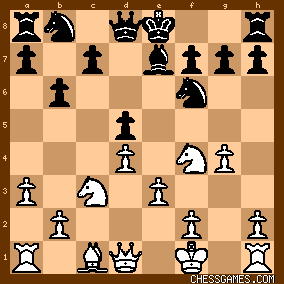
click for larger view<An improvement found in the quiet of my study. <<<For my opponent, of course, it was a surprise.>>> After 10.Qf3 c6 11.g4 0-0 Fine obtained a good position Shainswit vs Fine, 1951. But now Black does not manage to castle, since White carries out the entire plan without wasting a tempo on Qf3... This game is a clear example of how useful home preparation can be.> Mikhail Botvinnik "Half a Century of Chess" Ken Neat ed., E. Strauss transl. (Cadogan 1984), pp.185-87 ===
Golombek:
<"Shortly after resigning, (Smyslov)... came up to me and said quietly, rather as though he was appraising somebody else's game from the point of view of the opening theorist, <<<'Yes; the opening variation is bad for Black and should lead to a loss for him.'>>>"> -Harry Golombek, "World Chess Championship 1954" (Macgibbon & Kee 1954), p.11 #################################
3d game
Smyslov vs Botvinnik, 1954 (1/2) #################################
4th game
Botvinnik vs Smyslov, 1954 (1-0) Golombek:
<"Smyslov, though, as was only natural, he must have felt his bad start deeply enough, <<<could still joke about it with me,>>> and during the interval of free time before the game commenced he was quite happily discussing with me musical topics, opera, ballet and the like... The game was not finished in one day's play, but went to a second session. When Smyslov resigned it on the 24th, he was doing so on what should have been an auspicious occasion, for it was... his birthday."> -Harry Golombek, "World Chess Championship 1954" (Macgibbon & Kee 1954), pp.20-21 #################################
5th game
Smyslov vs Botvinnik, 1954 (1/2) Golombek:
<"For (this)... game <<<the venue was changed from the Tchaikovsky Hall to the Concert Hall of the Soviet Army;>>> but this hall being considerably smaller, it was soon full and, in order to avoid overcrowding, no more tickets were sold, much to the disgust of many latecomers who were unable to obtain admission."> -Harry Golombek, "World Chess Championship 1954" (Macgibbon & Kee 1954), p.28 #################################
6th game
Botvinnik vs Smyslov, 1954 (1/2) Golombek:
<"The (sixth) game <<<was again played>>> in the Concert Hall of the Soviet Army..."> -Harry Golombek, "World Chess Championship 1954" (Macgibbon & Kee 1954), p.35 #################################
7th game
Smyslov vs Botvinnik, 1954 (1-0) Golombek:
<"For the <<<seventh game...>>> we were back again in the beautiful Tchaikovsky Hall..."> -Harry Golombek, "World Chess Championship 1954" (Macgibbon & Kee 1954), p.40 ===
Botvinnik:
<"On this occasion <<<it was I who carelessly analysed the adjourned position>>> and, after still on the 48th move having a certain draw, I was forced on the 50th move to lay down my arms."> -Mikhail Botvinnik, "Botvinnik's Complete Games (1942-1956) and Selected Writings (Part 2)" pp.27-28 Adjourned position:

click for larger view 41...Ra7
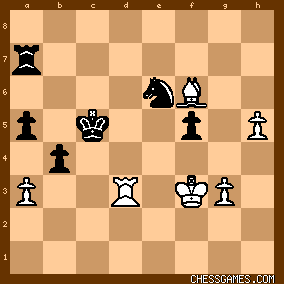
click for larger viewBotvinnik:
<"The <<<rook is excellently placed on the 7th rank,>>> holding up the h-pawn and supporting the advance of the queenside pawns."> -Mikhail Botvinnik, "Three World Chess Championship Matches: 1954, 1957, 1958" I.Y. Botvinnik, ed., Steve Giddins transl. (New in Chess 2009), p.37 Position after 48.a4-
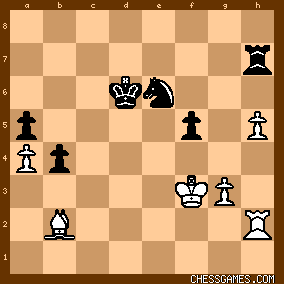
click for larger viewBotvinnik:
<"Now Black has another good drawing possibility- the manoeuvre ...Kd6-d5-c4 bxa4. <<<After obtaining two connected passed pawns on the queenside,>>> Black gives up his rook for the h-pawn (after the exhange of the g3 and f5 pawns) and draws.> -"Three World Chess Championship Matches" p.37
===
After 48...Ke7
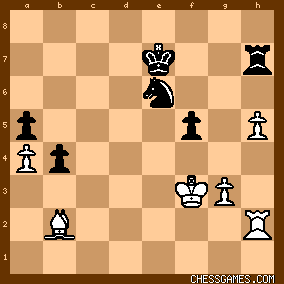
click for larger viewBotvinnik:
<"Incredible! Black finally plays his king to the 7th rank voluntarily, and loses. <<<I was so disappointed not to be able to find a satisfactory defence after 48.g4, that I forgot about the second drawing possibility.>>> The reader may be interested to know that when I came home, after the game, and picked up my pocket set, I found on the board a position in which a black knight and two connected passed a- and b-pawns were battling White's rook and bishop!"> -"Three World Chess Championship Matches" p.37
#################################
8th game
Botvinnik vs Smyslov, 1954 (1/2) Golombek:
<"...it should be remembered that the <<<psychological effect on Botvinnik in not winning such a won game>>> must have been very great indeed, and that the half-point he lost in the eighth game was not all the quantity of points that he was going to lose in consequence."> -Harry Golombek, "World Chess Championship 1954" (Macgibbon & Kee 1954), p.47 #################################
9th game
Smyslov vs Botvinnik, 1954 (1-0) Botvinnik:
<"...in the 9th I suffered a heavy defeat after inaccurate play in the opening. This game was undoubtedly <<<Smyslov's best achievement>>> in the match."> -"Botvinnik's Complete Games (1942-1956)" p.28
===
Golombek:
<"Botvinnik embarked on an interesting and complicated combination in which victory or defeat depended on a margin as narrow as a single hair's breadth. Unfortunately for the World Champion, he inadvertently transposed his moves and allowed Smyslov to obtain a won position by <<<a brilliant if fairly obvious Queen sacrifice.>>> The burst of applause this evoked from the spectators was somewhat difficult to quell."> -Harry Golombek, "World Chess Championship 1954" (Macgibbon & Kee 1954), p.53 #################################
10th game
Botvinnik vs Smyslov, 1954 (0-1) #################################
11th game
Smyslov vs Botvinnik, 1954 (1-0) #################################
12th game
Botvinnik vs Smyslov, 1954 (1-0) Golombek:
<"Today <<<television made its first appearance in the history of World Chess Championship matches,>>> the twelfth game being televised from 8 till 8:30 pm."> -Harry Golombek, "World Chess Championship 1954" (Macgibbon & Kee 1954), p.68 #################################
13th game
Smyslov vs Botvinnik, 1954 (0-1) Golombek:
"The thirteenth game... took place in the Concert Hall of the Soviet Army..." -Harry Golombek, "World Chess Championship 1954" (Macgibbon & Kee 1954), p.73 ===
Soltis:
"...Botvinnik revealed one of his new weapons, 5...b6, and it prompted Smyslov to launch an unsound attack (6.Nge2 d6 7.0-0 Bb7 8.f4 f5 9.g4?! fxg4 10.f5 Qd7) that lost in 41 moves." Position after <5...b6> 
click for larger viewPosition after <9.g4?!> 
click for larger viewPosition after <10...Qd7> 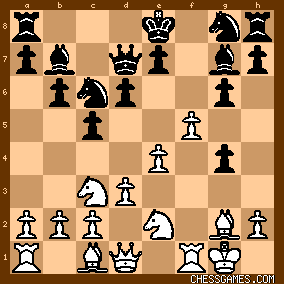
click for larger view-Andrew Soltis, "Soviet Chess 1917-1991" (McFarland 1997),p.220 ===
here is the full text from <Botvinnik's> notebook concerning the move <5...b6> in game 13, also from p.52: <"5...b7-b6
<<<I wanted to surprise my opponent>>>. Of course, he expected the continuation 5...e6, followed by ...Ng8-e7, which I played long ago as my game against Alexander at the Nottingham tournament of 1936. It later turned out that it was against this very system that Smyslov had prepared an unpleasant response: 5...e6 6.Be3 Nd4 7.Nce2!, although even here, theory now considers that Black can equalise by means of 7...b6 8.c3 Nxe2. However, as will become clear, the move 5...b6 cannot be considered very good. I found the correct plan for Black only in Game 15."> Botvinnik's notebook entry for Game 15: <"1.e2-e4 c7 c5 2.Nb1-c3 Once again, the Closed Variation. <<<Smyslov had evidently come to the conclusion that the system with 5...b6 is not sufficient for equality, and quite rightly so.>>> However, a surprise awaited him... 2... Nb8-c6 3.g2-g3 g7-g6 4.Bf1-g2 Bf8-g7 6.d2-d3 d7-d6 Black prepares to implement a different plan.
6.Ng1-e2.....
6...e7-e5! Now the bishop on g2 is shut in, the advance d3-d4 becomes hard to achieve, and the advance f2-f4 can be met by ...f7-f5."> -"Three World Chess Championship Matches" pp.57-58 the first 5 moves of game 13 and game 15 are identical, except that in game 15, instead of playing <5...b6>, Botvinnik now plays the move his analysis suggests is superior, <5...d6>. ===
EDIT <thomastonk> "Botvinnik said that he wanted to surprise Smyslov, but he didn't state that he had prepared it. And since the line is not in the notebook, it is definitely possible that he decided to play 5.. b6 at the board." EDIT <thomastonk> Yesterday I found the German edition of Botvinnik's match book for the WC match of 1954 (published in 1957). The original text of the game comments is the same as for the 2007 edition, I would say, but the translations differ.
The comment on 5.. b6, which is discussed above, does not use the German word for '(to) surprise' (Überraschung/überraschen), but the German word for 'change' or 'alternation' (Abwechslung). So, I had to consult the Russian original. The word Botvinnik used is 'разнообразие', and according to my dictonary the old translation is better. This is is only a small detail, and in fact it would be necessary that a Russian speaker would read the whole paragraph, but maybe even this single word supports the possibilty that 5.. b6 was no home-preparation. A book can win or lose in translation, the truth always loses. ;-) #################################
14th game
Botvinnik vs Smyslov, 1954 (0-1) Soltis:
<"Smyslov later said the game that gave him the greatest esthetic pleasure in his entire career was the 14th of the match. But Botvinnik later saw treachery, since in the 14th game Smyslov quickly innovated in an opening Botvinnik had never tried before. <<<He accused his second, Kan, of disclosing his opening preparation to the enemy camp.>>> Even though Smyslov publicly denied this, Botvinnik never took back his accusation."> -Andrew Soltis, "Soviet Chess 1917-1991" (McFarland 1997),p.220 ===
The following is not confirmation for <Soltis'> claims but it hints strongly at the notion <Botvinnik> did suspect <Kan> had given away secret preparations in this game. This is what <Smyslov> writes, from this position, Black to move: 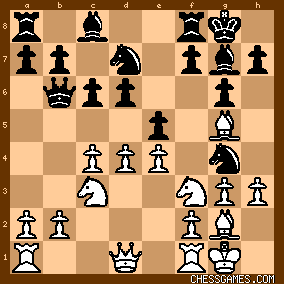
click for larger viewAnd now,
<"11...exd4! A highly unpleasant <<<surprise>>>, leading to great tactical complications..."> 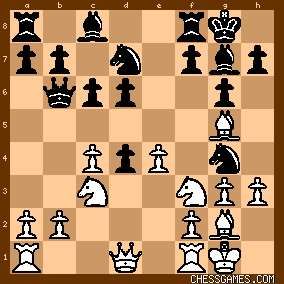
click for larger view<"...This continuation made such a strong impression on my opponent, that in his notes to this game Botvinnik wrote: <<<'It is surprising that Smyslov was able to make highly detailed preparations for a variation which I had never before adopted, except in training games...'>>>"> I suppose the rest of the passage might serve as something like a "public denial" by Smyslov that he was gifted with this analysis by somebody else. Smyslov:
<"As we know, the move 9.Be3 had been played earlier, and so, <<<in my theoretical analysis>>> of this opening system, this move was also examined, along with 9.d5 and 9.h3. And I succeeded in discovering an improvement for the defence with 11...exd4! Such is the history of the innovation which brought me success in the present game."> -Vasily Smyslov, "Smyslov's 125 Selected Games" Ken Neat transl. (Cadogen 1983), pp.86-87 Here is <Botvinnik> speaking for himself about the nasty <11...exd4!> surprise: <"My opponent played the last three moves (Botvinnik means moves 9-11) immediately, about which <<<I could not hide my surprise>>>. It is certainly rather surprising that Smyslov should have been so well prepared in all the subtleties of a variation that I had never played before, except in training games..."> -Mikhail Botvinnik, "Three World Chess Championship Matches: 1954, 1957, 1958" I.Y. Botvinnik, ed., Steve Giddins transl. (New in Chess 2009), p.55 The ellipses (...) are added by <Botvinnik>. In this context, they seem intended to connote something "implied but not said." At <Nikolina gora> from 17 Oct. 1952 up until 13 Feb. 1954, on the eve of this match, <Botvinnik> played no fewer than 27 training games with <Kan>, so there can perhaps be little doubt "which training games" he is referring to here. -Jan Timman, "Secret Matches: The Unknown Training Games of Mikhail Botvinnik" (Russell Enterprises Inc. 2000), pp.59-78 ===
Golombek:
<"...back in the Tchaikovsky Concert Hall... <<<(on) move 10... Smyslov launched an innovation with the most exciting consequences...>>> (Smyslov) had clearly prepared the opening variation, as was evident from the time he took for the first eleven moves-- only twelve minutes. Botvinnik, though realising this, made no attempt to avoid the variation or transpose into one of the numerous other lines against the King's Indian. He would have been wiser had he done so, even if less courageous."> -Harry Golombek, "World Chess Championship 1954" (Macgibbon & Kee 1954), p.78 ===
Botvinnik on games 13 and 14:
"Smyslov's reckless play in the initial stage of the 13th game provided me with a new success. True, the same tactics enabled Smyslov to gain a spectacular win in the next tame, the 14th, but I think that this win contributed to the match subsequently tking a course unfavourable for my opponent." -"Botvinnik's Complete Games (1942-1956)" p.28
#################################
15th game
Smyslov vs Botvinnik, 1954 (0-1) #################################
16th game
Botvinnik vs Smyslov, 1954 (1-0) #################################
17th game
Smyslov vs Botvinnik, 1954 (1/2) #################################
18th game
Botvinnik vs Smyslov, 1954 (1/2) Botvinnik:
<"...on one occasion in our match the arbiter Opocensky had to intervene; this occurred during the 18th game. Soon after the opening Smyslov's clock stopped, which was noticed by the demonstrator only some fifteen minutes later! More precisely, the clock did not stop- it continued going, and only the minute hand stopped, and so neither I nor my opponent noticed this, since the clock continued ticking... During play a second, electric chess clock was in use, enabling th spectators to observe the situation on our clocks. This electric clock was operated by the demonstrator, and it was he (with a delay of fifteen minutes) who drew the arbiter's attention to the fault in Smyslov's clock. Of course, Opecensky ordered that the faulty clock should be replaced. <<<In so doing, however, he set my opponent's clock to the same time as had been shown by the faulty clock! To my bewildered question, the arbiter replied that there was no mention in the match regulations about supervisory electric clocks, and therfore he couldn't put Smyslov's clock forward, although, essentially, it was clear how long the clock had stood still.>>> I immediately accepted the arbiter's decision, although I considered it incorrect. I decided not to approach Smyslov directly; he was so engrossed in the position that he did not notice either our discussions, which took place at the other end of the stage, or the change of clocks itself, otherwise he would undoubtedly have asked that his clock be put forward..."> -"Botvinnik's Complete Games (1942-1956)" pp.29-30 ===
Golombek:
<"On move 15 <<<Smyslov's clock stopped>>> (for no good reason that could afterwards be proved) and this was not noticed for some time. When it was noticed, a new clock was substituted, but it was deemed impossible to adjust Smyslov's time accordingly."> -Harry Golombek, "World Chess Championship 1954" (Macgibbon & Kee 1954), pp.97-98 #################################
19th game
Smyslov vs Botvinnik, 1954 (1/2) #################################
20th game
Botvinnik vs Smyslov, 1954 (0-1) Golombek:
<"When Botvinnik resigned on the seventy-third move there was a <<<great burst of clapping and cheering from the audience,>>> and this applause was indeed well merited by Smyslov, who in this game had shown himself to be the world's best end-game player."> -Harry Golombek, "World Chess Championship 1954" (Macgibbon & Kee 1954), p.110 #################################
21st game
Smyslov vs Botvinnik, 1954 (1/2) #################################
22d game
Botvinnik vs Smyslov, 1954 (1/2) #################################
23d game
Smyslov vs Botvinnik, 1954 (1-0) Golombek:
<"...on the twenty-third move... <<<(Botvinnik) committed a terrible blunder>>> that lost two pawns and left him with a wrecked position. In another five moves he had resigned and the score was level at 11 1/2 all."> -Harry Golombek, "World Chess Championship 1954" (Macgibbon & Kee 1954), p.126 #################################
24th game
Botvinnik vs Smyslov, 1954 (1/2) Botvinnik:
<"Since the first twenty-three games had ended with the result 11 1/2 - 11 1/2, and thus I had not succeeded in outplaying my opponent- we had both demonstrated roughly equal strength, the last, 24th game had a restricted competitive importance. And when Smyslov, after considering his 22nd move, decided, to my great surprise, to offer a draw, thus giving up any last hope in this match of winning the title of world champion, what was I to do? <<<'Your offer is so tempting',>>> I replied, <<<'that it is impossible to refuse...'>>> To the credit of both players it should be added that this game was the only one where there was a premature end to the struggle."> -Mikhail Botvinnik, "Botvinnik's Complete Games (1942-1956) and Selected Writings (Part 2)" Kean Neat ed., transl. (Olomouc 2012), p.29 ===
Golombek:
<"Since a draw was enough for the Champion to retain his title, he had every inducement to play safe and hold on to equality rather than go all out for the win, and, whereas <<<Smyslov should have been prompted by more aggressive feelings,>>> he seemed loth to risk too much himself and so lose the match."> -Harry Golombek, "World Chess Championship 1954" (Macgibbon & Kee 1954), p.130 ===
Golombek:
<"The former World Champion, Dr. Max Euwe, had been expected to attend the closing stages of the match, and it had been hoped he would place the wreath of victory over the shoulders of whichever player won the Championship. But unfortunately he proved to be busy conducting examinations... and could not come. In compensation, however, <<<he sent his daughter,>>> who acted in the same capacity."> -Harry Golombek, "World Chess Championship 1954" (Macgibbon & Kee 1954), p.121 #################################
Evaluations
Botvinnik:
"I think that Smyslov's great creative achievement in the... match was his skilful preparation." -"Botvinnik's Complete Games (1942-1956)" p.31
===
Smyslov:
<"So the match has ended in a draw with the score 12-12 and, according to the conditions of the contest, Botvinnik retains his title of World Champion. <<<I regard this drawn outcome of a struggle that has lasted some two months as honourable enough for me...>>> Never before have I had occasion or opportunity to play a match, and the brief interval of time between this event and the arduous tournament at Zurich made it impossible for me to acquire the necessary experience of match play. Maybe this very circumstance to a certain extent explains my failures in the first part of the match... During the whole match I was lacking in consistency. Intermingled with the creative achievements of the ninth and fourteenth games, which I consider my best games of the match, there were moments of weak play, more especially in those in which the Sicilian Defence was played (the thirteenth and fifteenth games). Botvinnik's best game was the twelfth."> -Harry Golombek, "World Chess Championship 1954" (Macgibbon & Kee 1954), p.145 ===
-<Collusion controversy> Courtesy of <Edward Winter>, here is an interesting, albeit second hand, report by <Kotov> on this round 21 game from the Zuerich Candidates (1953) Kotov vs Smyslov, 1953 <3639. An admission
From page 242 of Official Chess Handbook by K. Harkness (New York, 1967): ‘So far as the complaints of collusion among Soviet players are concerned, it is undoubtedly true that the Soviet contestants in FIDE tournaments, especially in the early competitions, have played as a team and not as individuals. Alexander Kotov admits this in his Memoirs of a Chessplayer, published in the USSR in 1960. He apologizes for his victories over Smyslov in 1933 sic and Botvinnik at Groningen in 1946, and hopes he will be forgiven, since he made up for these lapses by defeating Reshevsky and Euwe respectively in these tournaments.' <<<The reference to Smyslov evidently concerned the 1953 Candidates' tournament,>>> but can a reader send us the exact text (ideally in both Russian and English) of Kotov's admission?> http://www.chesshistory.com/winter/... ########################
OhioChessFan EDIT Quoting the existing intro to this event:
All the games were full of fight, and many of the games were of theoretical significance. "All but the final game, maybe. Smyslov's draw offer is inexplicable to me. And I think some mention of the controversy is in order." Botvinnik vs Smyslov, 1954 ===
Botvinnik:
<"Since the first twenty-three games had ended with the result 11 1/2 - 11 1/2, and thus I had not succeeded in outplaying my opponent- we had both demonstrated roughly equal strength, the last, 24th game had a restricted competitive importance. And when Smyslov, after considering his 22nd move, decided, to my great surprise, to offer a draw, thus giving up any last hope in this match of winning the title of world champion, what was I to do? <<<'Your offer is so tempting',>>> I replied, <<<'that it is impossible to refuse...'>>> To the credit of both players it should be added that this game was the only one where there was a premature end to the struggle."> -Mikhail Botvinnik, "Botvinnik's Complete Games (1942-1956) and Selected Writings (Part 2)" Kean Neat ed., transl. (Olomouc 2012), p.29 ##################################
FIDE Congress, Stockholm 1952
FIDE Congress, Switzerland 1953
FIDE Congress, Amsterdam, 1954)
| 


